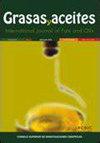Estimation of mass transfer terms in the lycopene recovery employing Moringa oleifera Lam oil as solvent
IF 1.1
4区 农林科学
Q4 CHEMISTRY, APPLIED
引用次数: 0
Abstract
The aim of this work was to assess the terms associated with mass transfer in the lycopene recovery from the waste of a tomato canning plant. Moringa oleifera Lam oil was employed as solvent. An ultrasonic extraction was carried out on skin and seeds. The operational variables were temperature (skin: 45, 60, 75, 90 ºC; seed: 45, 60, 75 ºC), matrix/solvent ratio (m/v) (1:20, 1:25, 1:30), particle size (skin: < 1, 1-2, > 3.15 mm; seed: < 1, 1-2, > 2 mm) and extract separation method (filtration and centrifugation). Kinetic constant, lycopene concentration on the solid surface, volumetric coefficient of mass transfer and effective diffusivity were determined. The more the kinetic constant increased, the higher the volumetric coefficient of mass transfer was. Effective diffusivity increased with temperature. Activation energy values suggest a possible deterioration of lycopene at temperatures higher than the optimum. The use of M. oleifera oil as solvent should increase the biological value of the lycopene extracts.以辣木油为溶剂回收番茄红素的传质项估算
本研究的目的是评估从番茄罐头厂废料中回收番茄红素过程中与传质有关的条件。以辣木油为溶剂。采用超声提取法对果皮和种子进行了提取。操作变量为温度(皮肤:45、60、75、90℃;种子:45、60、75ºC),基质/溶剂比(m/v)(1:20、1:25、1:30),粒径(皮:<1,1 -2, >3.15毫米;种子:& lt;1,1 -2, >2 mm)和萃取分离方法(过滤和离心)。测定了动力学常数、固体表面番茄红素浓度、体积传质系数和有效扩散系数。动力学常数越大,传质体积系数越大。有效扩散系数随温度升高而增大。活化能值表明番茄红素在高于最佳温度时可能变质。利用油橄榄油作为溶剂,可以提高番茄红素提取物的生物学价值。
本文章由计算机程序翻译,如有差异,请以英文原文为准。
求助全文
约1分钟内获得全文
求助全文
来源期刊

Grasas y Aceites
工程技术-食品科技
CiteScore
2.50
自引率
0.00%
发文量
50
审稿时长
3 months
期刊介绍:
Grasas y Aceites is a peer-reviewed journal devoted to the publication of original articles concerning the broad field of lipids, especially edible fats and oils from different origins, including non acyl lipids from microbial origin relevant to the food industry. It publishes full research articles, research notes, reviews as well as information on references, patents, and books.
Grasas y Aceites publishes original articles on basic or practical research, as well as review articles on lipid related topics in food science and technology, biology, (bio)chemistry, medical science, nutrition, (bio)technology, processing and engineering. Topics at the interface of basic research and applications are encouraged. Manuscripts related to by-products from the oil industry and the handling and treatment of the wastewaters are also welcomed.
Topics of special interest to Grasas y Aceites are:
-Lipid analysis, including sensory analysis
-Oleochemistry, including lipase modified lipids
-Biochemistry and molecular biology of lipids, including genetically modified oil crops and micro-organisms
-Lipids in health and disease, including functional foods and clinical studies
-Technical aspects of oil extraction and refining
-Processing and storage of oleaginous fruit, especially olive pickling
-Agricultural practices in oil crops, when affecting oil yield or quality
 求助内容:
求助内容: 应助结果提醒方式:
应助结果提醒方式:


